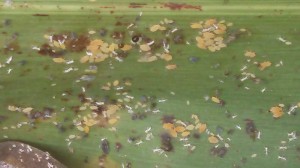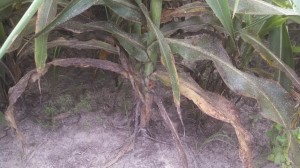I have been learning more about aphid entomology than I bargained for this week. This spring and summer I have read about challenges with Sugarcane aphids in the Mid South, Deep South, and Texas. I have been thinking we were fortunate not to deal with the pest. However, this week we have tentatively identified the aphids here in Columbia County, pending confirmation. I have heard a positive identification has been made in Alachua County already. My first encounter was 10 days ago when a sorghum grower called me to report aphids. My reaction was, “we always have aphids, don’t worry about it.” When I learned this week what we are dealing with, I called him back and he confirmed that in seven days his crop went from lush green to black. This matches the voraciousness of this pest reported by others in Extension throughout the south. Here is a FACT SHEET from Dr. Villaneuva et al. describing the national situation.
There are many nuances better left to trained entomologists to explain how and why this aphid is different than the Sugarcane aphid that has perennially existed in Florida. However, this is a different beast with a different range of host plants. This is the farthest southeast this aphid which utilizes sorghum as a host has been found. Dr. Neussly, UF Professor of Entomology has been tracking the movement of this pest from Texas since its discovery in 2013.
My current interpretation of control measures as recommended by Dr. David Buntin, UGA Extension Entomologist, is that Lorsban is the only labeled control in Florida. The recommended rate is 1-2 pints per acre, with a maximum use rate of 2 pints per application, and 3 pints per season. Preharvest interval (PHI) restrictions include a 60 day PHI for the 2 pint rate and 30 day PHI at the 1 pint rate. These PHI’s are for either grain or forage.
Several states have obtained Section 18 labels for the use of Transform insecticide at the rate of 1 oz per acre. Florida does not have a Section 18 label at this time, nor will one be available this crop year. Dr. Angus Catchot, Mississippi State University Extension Entomologist has provided updated recommendations for Mississippi HERE
This area of Florida has many acres of late planted forage sorghum which will apparently be at high risk for damage based on the observed rapid movement of this pest.



Pingback: White sugarcane aphid now causing problems in Georgia, Florida sorghum | IPM in the South